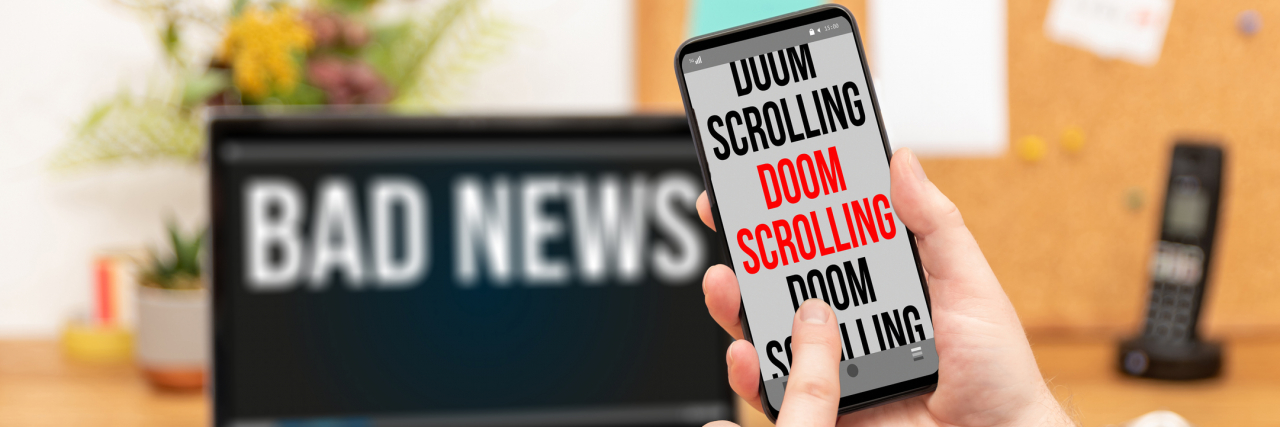I’ll admit it: I’m a “doomscroller.” I wouldn’t call it “bad habit,” because at this point, it has gone beyond that. I’ve become an expert at perusing hundreds of articles, videos, and blog posts — some opinion, some news, and some opinion disguised as news — only to find that once I’ve put my phone down, I haven’t really “stopped.”
The truth is, my brain hangs on to everything I read — every word, every implication, every angrily-worded comment — and I find myself trapped in a terribly maladaptive cycle that goes a little something like this: Check the news. Fall down the rabbit hole. Feel hopeless. Check the news again in some deluded sense it will alleviate the hopelessness. Fall down the rabbit hole again. Repeat the cycle.
If you’re like me, this is a daily occurrence, even more so during difficult times (which, let’s be real, only seem to get worse rather than go away). This has resulted in lack of motivation, bursts of negative emotion, and an overall nihilistic attitude. And worst of all, it does absolutely nothing to help.
The human brain can only process so much at a given time. While the advent of phones and the internet is, in many ways, a blessing rife with social and educational possibilities (the world truly is at our fingertips), there comes a time when the constant influx of headlines no longer educates us — it very nearly destroys us. Dramatic as I wish I was being, research has demonstrated the adverse effects of too much news exposure. Furthermore, it appears as if people with preexisting mental illnesses seem to find themselves falling down that proverbial rabbit hole often.
Whether or not you’re a doomscroller or you struggle with mental illness (or both), one thing is clear: We’re in the midst of an information overload. While keeping up to date with current events is not bad in and of itself, some of us cross the line of staying in the loop and find ourselves deep within the territory of clickbait, sensationalized opinion pieces, and fiery comments.
So what can we do? How can we resist the urge to scroll endlessly while still remaining up to date? For starters, we can be mindful about what kind of news we are reading (or watching). Subscribing to sites like 1440 Daily Digest is a great way to get all the news you need in a reliable and trustworthy way.
Likewise, we need to start setting limits on our doomscrolling. Here’s another confession: asking me to stop doomscrolling is like asking me to cut out foods I know are bad for me. It’s near impossible. So, instead of telling myself to stop it all, I give myself five to 10 minutes a day to doomscroll to my heart’s content (a time limit I am planning to lower in the coming weeks). If I let myself go unchecked, I can easily scroll and worry for hours; if I need to send myself a sternly-worded reminder to stop, so be it.
Of course, what we do offline is just as important as what we do online. “Taking time for self-care” is advice we’ve all probably heard a million times, and though it is often easier said than done, it is essential. Small things like drinking my coffee outside in the morning, writing at night, and grabbing lunch with friends have become integral parts of my day. Talking about my worries with friends and family members can also alleviate stress, as can treating myself to a good meal.
The sad truth is this: The world is upsetting right now. In some way, perhaps it has always been. While I am a massive advocate for remaining educated and doing what we can to help, I also have had to acknowledge that I spend more time excessively worrying than I do engaging in activities of consequence. My worry adds nothing to the world but self-inflicted pain, and while that doesn’t mean I won’t stop worrying (it has been my fatal flaw since childhood and something I will always work on), being aware of my proclivity to engage in unnecessary and needless behaviors has been a starting point in my journey to stopping them.
Read, learn, interact, donate, and spread the word about things going on in our world, but don’t let it destroy you. Don’t ignore your struggle because others have it worse; if you continue on the path that I too find myself wandering far too often, you’ll be in no position to help, I find you’ll only add to the pain.
If the last few years have taught us anything, it is that we need to find a way to stay informed while also not losing our ability to help. Difficult as it may be, there are ways to do so — we simply need to be mindful about our habits and learn to pinpoint when we’re hurting instead of helping.
After all, when we ourselves break, we cannot help rebuild.
Getty image by Thomas Faull

